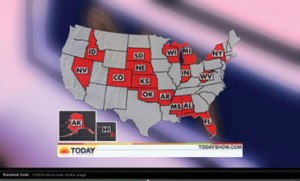Training Requirements for 9-1-1

The Today Show reported that 18 states do not have minimum training requirments for 9-1-1 telecommunicators.
On the Thursday, Jan. 7, edition of The Today Show, NBC aired a story all APCO members and public safety telecommunicators should be aware of: “911 Emergency: Are Operators Ready for Your Call?” In this story, Jeff Rossen reported on a three-month investigation into the lack of national training standards for 9-1-1.
To give the story a human perspective, the report showcased the story of two-year-old Matthew Cantrell in Murphy, Texas, who died in October 2007 following an incident in which he was entangled in a soccer net and choked. During the 9-1-1 call, the calltaker did not offer any pre-arrival instructions, despite the mother’s request for CPR instructions. Texas does not require CPR training for 9-1-1 telecommunicators.
In fact, the report indicated that 18 states actually have no 9-1-1 training requirements at all. In an interview for the piece, APCO President Richard Mirgon called the lack of training requirements “a major public safety threat. It’s putting lives at risk every day.”
Mirgon also pointed out that telecommunicators are frequently paid less than fast food workers and that the fees earmarked for 9-1-1 are often diverted by states to fund other priorities.
The reporter also spoke with Rep. Anna G. Eshoo (D-Calif.), asking about the need for federal oversight of the 9-1-1 system. Eshoo indicated that hearings would be called to explore and address any inadequacies of the 9-1-1 system.
NENA issued a statement in response to the segment. “While raising several important issues, we did not feel that it gave full or fair coverage to all aspects of the story or the 9-1-1 system,” said Patrick Halley, government affairs director for NENA.
“[No] 9-1-1 calltaker should ever be blamed if their local government or 9-1-1 authority has not implemented practices designed to help telecommunicators save lives, such as Emergency Medical Dispatch (EMD),” said Craig Whittington, ENP, NENA president. “These implementations are major local policy decisions involving the 9-1-1 center, the local government, emergency medical services (EMS) provider and medical director in order to ensure proper training, oversight and regular audit and review. The decision to use EMD cannot be made at the discretion of the telecommunicator working in the public safety answering point (PSAP). Further, just ‘knowing CPR,’ as discussed in Mr. Rossen’s interview with Ms. Cantrell, does not sufficiently prepare a telecommunicator to provide CPR instructions over the phone.”
“After watching the show, at least asking about how ’your’ 9-1-1 and emergency communications system is funded, led, trained and staffed might be a good idea,” said Chief Billy Goldfeder, founder of FirefighterCloseCalls.com.
In comments to Rossen at the end of the story, Matt Lauer said people need to be responsible for prevention, a positive message for the public. But when that doesn’t work, people dial 9-1-1, and emergency calltakers and dispatchers must be appropriately trained to answer those calls for help.
In a statement to PSC after the story aired, Mirgon said, “Stories about 9-1-1 are generally negative in nature and wrongly place blame on the dedicated professionals who take and dispatch 9-1-1 calls. However, this story presented an in-depth analysis of the complex issues involved and encouraged the public to learn more, which is exactly the message we wanted to convey. It was obvious that they took the time to really explore the industry and its professionals, and that is greatly appreciated. I am proud to be associated with this story.”
Training is an issue APCO and PSC take very seriously, and our Editorial Advisory Committee has decided to find out for ourselves just what training is required by individual states. We’re conducting a survey, and the results will be published later this year. Keep reading PSC and this e-newsletter to stay on top of this very important topic.
To view the Today Show video, click here.
To view the full NENA response, click here.
About the Author
Keri Losavio is the editor of Public Safety Communications. Contact her via e-mail at losaviok@apcointl.org.

